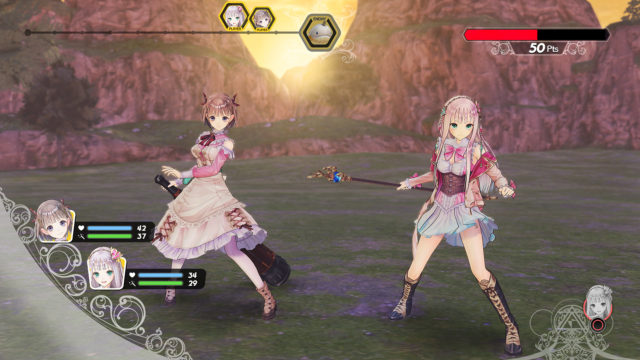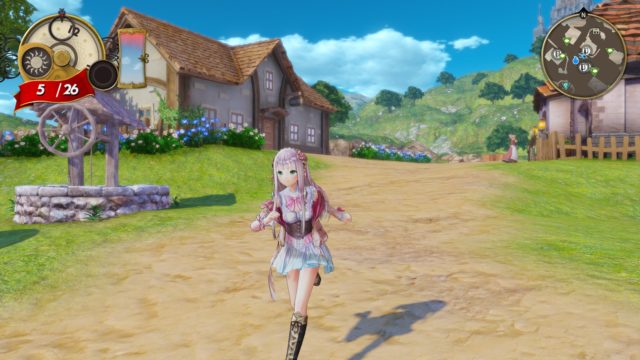Classic JRPG gameplay; lots to do; refreshing female-focused cast
Not terribly difficult; plotline isn't that revolutionary; a few control bugs
Most JRPGs follow certain specific formulas. There are plucky protagonists. Turn-based combat, even if it isn’t always obvious. Experience points and leveling up. Items and equipment. Suggestive dialogue that has to be toned down a little for a North American release. Possibly a bit of crafting. And maybe a hook or two to try and be distinctive from the rest of the crowd. Atelier Lulua: The Scion of Arland is a game that runs a lot like your typical JRPG. There are plucky protagonists. Turn-based combat, and it is patently obvious. Experience points and leveling up. Items and equipment. Suggestive dialogue that was probably toned down a bit for a North American release. But not just a bit of crafting. A lot of crafting. Tons of crafting. Crafting upon crafting. The question is … does the formula work?
Atelier Lulua: The Scion of Arland is a multi-platform title, having released for PlayStation 4 and PC, in addition to Switch. The game is available in both digital and physical versions for Switch and PlayStation 4 and is available as a digital-only game for PC via Steam. The game is developed by Gust Studios, an RPG-focused studio inside Koei Tecmo. At launch, the game runs $59.99, a full retail price. On Switch, the game currently takes up around 5-6 GB of storage space.
This is the fourth game in the Arland series, after Atelier Rorona, Atelier Totori, and Atelier Meruru. While the games all take place in the same world and there are references to those games in Atelier Lulua, you don’t have to have played anything else to enjoy this game, as the story is by and large self-contained.

The formula is, in many ways, vintage Japanese RPG. Players take on the role of a young protagonist setting out into a wide world, assembling a party, collecting items and equipment, crafting things, and engaging in pretty conventional turn-based combat. Consistent with modern games, battles are not random, so enemies can be avoided or even struck on the field to initiate a surprise attack. There are, though, a few ways in which Atelier Lulua goes places many other JRPGs don’t. For one, this is a decidedly female-led cast: three of your first four acquired characters are women, including the title character, Lulua herself. Women appear in many other places, too, with female-dominated storylines in a decent chunk of the game. The plotlines, although nothing particularly groundbreaking, have a different tenor than your typical boy-sets-out-on-adventure trope, and it’s a nice change of pace.
For another: alchemy. A centerpiece of the game is Lulua’s work around a cauldron, where she works to craft items and, eventually, gear. Throughout the game, players will venture into all kinds of lands, foraging for basic raw materials that can be combined into things like healing agents, bombs, and exploration items that Lulua can use to acquire more raw materials or access certain areas. The alchemy component is important, as certain recipes must be completed to advance the storyline, and even lesser ones help to give players more options in gameplay.
The production values are mostly good. The art design is just beautiful, from the hand-drawn characters to the beautiful vistas. The graphics run smoothly and look particularly cool in combat. The music is also pretty solid: the tunes are catchy and the game does some slick variations on the same themes between different locations to help create a sense of elevated curiosity.
For this game, Koei Tecmo opted not to record any English voices. While there are English subtitles, all the spoken dialogue is in Japanese. This is cool in its own way, but it’s also unfortunate that we didn’t get to hear some of these exchanges in English. I have no doubt that it was a cost decision, and I’ll take it over not having the game on Switch at all.

One final note: the Switch version had a couple of bugs, mostly with the controls. In particular, some of the menus would respond either to the stick or the left d-pad but not both: in one case, it took me hours to discover that I could equip items for the field, because tilting the joystick down toward the tools menu didn’t do anything. With any luck, these bugs will get ironed out in future patches.
Overall though, the game runs pretty smoothly, and is a good deal of fun to play. Atelier Lulua: The Scion of Arland is a deep, charming game with lots to do and explore, and is a worth a look if you’re a Switch owner looking to get an RPG fix. Recommended.
Nintendojo was provided a copy of this game for review by a third party, though that does not affect our recommendation. For every review, Nintendojo uses a standard criteria.




 ShareThis
ShareThis





